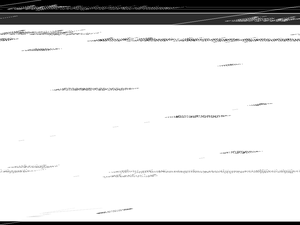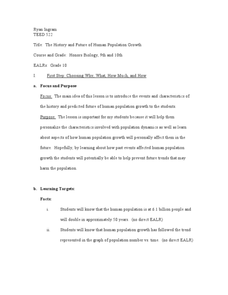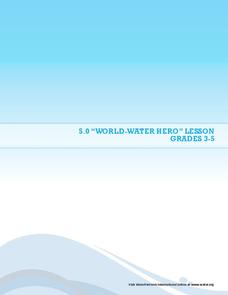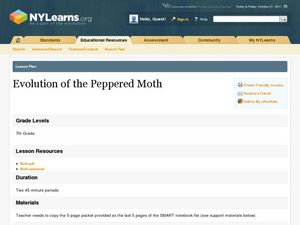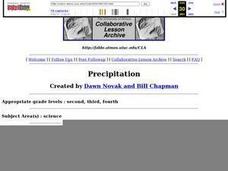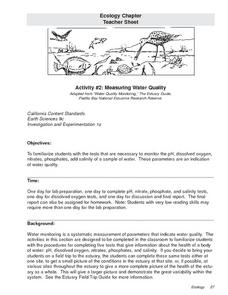Curated OER
Insects
Students, through books, videos, and readings, explore characteristics of insects. In groups, they choose an insect to research. Students discover their insect's diet, how they move, and where they live. Afterwards, they use the facts...
Curated OER
The Flat Stanley Project
Students read the book Flat Stanley. In this environmental stewardship lesson, students participate in earth-friendly activities based upon the book. This lesson includes ideas such as using recycled paper to make a "paper pal."
Curated OER
Plant a Seed
Students complete a seed and plant growth activity. In this plant growth lesson, students read about Lady Bird Johnson and then answer questions about her role in the beautification and the environment. Students participate in a seed...
Curated OER
Reduce, Reuse & Recycle
Students determine the differences between the terms reduce, reuse and recycle. Students complete a worksheet after a book is read, or information from a website is shared. Students brainstorm ways to reduce, reuse and recycle.
Curated OER
Sunscapes
Students share their observations of the Sun, then analyze images collected by NASA's Solar and Heliospheric Observatory. They create exhibitions for presentations.
Curated OER
The Animals of Julie of the Wolves
Students explore Arctic animal life through use of electronic resources. They discover facts about various animals that share that ecosystem with wolves.
Curated OER
Web Research Helps Students Choose Classroom Pets
Students interview different teachers in their school. They decide which pet would fit best in each classroom. They share the information they gathered with the class.
Curated OER
What You Can Do For the Tijuana Estuary
Students discuss how they can be involved in the protection of the Tijuana estuary. In groups, they develop a brochure to share with their community what they can do to save the estuary. They share them with the class and hand them out...
Curated OER
Designing Our Own Inventions
Third graders use research from a previous lesson to design their own inventions. In groups, they brainstorm a product they would like to see built and share them with the class. They must explain how each one would serve a purpose or...
Curated OER
The Great Kapok Tree
Students investigate the Rainforest. In this Rainforest lesson, students read the book <i>The Great Kapok Tree</i> and discuss the various animals living in the Rainforest. Students illustrate and write a short report on...
Curated OER
The History and Future of Human Population Growth
Pupils create a timeline of human population growth based on guided reading. In this biology lesson, students analyze the trend of how population increased over time. They share their findings in class.
Curated OER
Is Soil Alive?
Third graders observe soil samples. They then form hypotheses as to whether or not soil is alive. Students read and discuss information about soil and components of soil. They state wheter or not they believe soil is alive and list...
Curated OER
The Water Dilemma
Students read about and discuss the importance of easily available, clean drinking water. They participate in a role play scenario in which only one drinking fountain in the school has potable water.
Curated OER
What About Pumpkins
Second graders read 'Big Pumpkin' by Eric Silverman. In teams of 'pumpkin investigators', using real pumpkins, they discover how a pumpkin feels and smells, how much one weighs, and determine which group has the largest pumpkin.
Curated OER
World-Water Hero
Students explore why clean water is essential. For this environmental lesson, students identify the "powers" we need to improve the quality of water. Students share their descriptions of world-water superheroes.
Curated OER
Evolution of the Peppered Moth
Seventh graders complete a timeline about the evolution of the peppered moth. In this biology lesson, 7th graders write an essay about how human can affect evolution. They share their essay with the class.
Curated OER
Precipitation - Pot of Ice/Pot of Boiling Water Experiment
Students observe an experiment where a pot of ice is held over a pot of boiling water. They predict what will happen and then share what they see as the experiment takes place. Then the concept of condensation and precipitation is...
Curated OER
Where Next?
Students read an article explaining NASA's possible Mars landing sites. They use the Internet to research Mars and the Module. They are able to submit their own proposals for a landing site after researching the planet.
Curated OER
Measuring Water Quality
Students are introduced to the various methods of measuring water quality. In groups, they test various water samples using the different methods, writing them down for pH, oxygen, salinity, and nitrate levels. They use their data to...
Curated OER
Identify Virginia Native Animals
Young scholars practice using an online encyclopedia to research native animals to Virginia. Using the information from the encyclopedia, they identify the main and supporting ideas. They share their information with the class using...
Curated OER
Brine Shrimp 1: Hatching Brine Shrimp
Students review their prior knowledge on brine shrimp. In groups, they raise a group of brine shrimp and design an artificial environment in which they can live. They change the conditions of the environment to see how the shrimp react...
Curated OER
Glue-line Insect
First graders explore characteristics of ladybugs. They view ladybugs in ventilated containers and discuss their observations. Students read a story about ladybugs and create a glue picture of a ladybug.
Curated OER
Be the Kiwi: What is going on in New Zealand?
Students study the three environmental issues facing New Zealand today. In this ecology lesson, students brainstorm some solutions to these environmental issues. They share what they have written in their journals.
Curated OER
Teen Health: Talking with Your Doctor
Learners discuss common health care issues they're facing today. In this health science lesson, students explain the benefit of seeking professional help. They write a journal to keep track of their own health issues.




